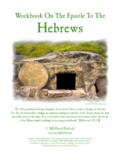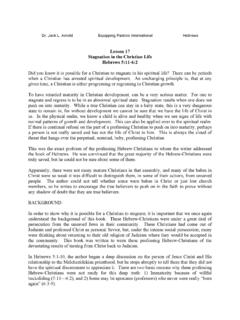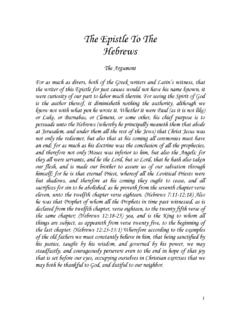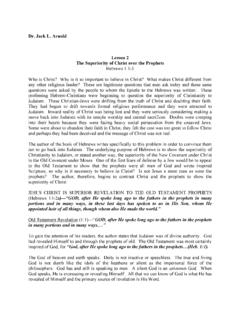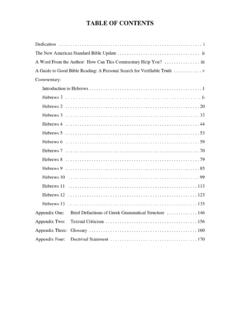Transcription of The Exaltation of Jesus in the Epistle to the Hebrews
1 The Exaltation of Jesus in the Epistle to the Hebrews The Exaltation of Jesus in the Epistle to the Hebrews By David Maas 5 April 2010. 218 Main Street, Unit 133. Kirkland, Washington, 98033, USA. Hebrews 1:1-3, Whereas in many parts and in many ways of old, God spake unto the fathers in the prophets, at the end of these days He hath spoken unto us in his Son whom he hath appointed heir of all things, through whom also he hath made the ages; Who being an eradiated brightness of his glory and an exact representation of his very being, also bearing up all things by the utterance of his power, purification of sins having achieved, sat down on the right hand of the majesty in high places.
2 [The Emphasized Bible]. ~ THE ISSUE ~. In the orthodox Nicene faith Jesus is presented as the unchanging and eternal Divine Son who is of the same substance or essence as God the Father. Though he assumed a human nature at the incarnation . and temporarily emptied himself of divine prerogatives and authority, he retained his divine nature throughout and reassumed all his prerogatives and authority following his death and resurrection. When exalted by the Father Jesus laid claim to that which was his by nature and which he previously possessed. Since God is immutable so is the eternal and Divine Son. A theme threaded throughout the Epistle to the Hebrews is that of the transition of the Son from one status to another, which takes place at a specific point or points in time when he transitions from a previous state of weakness and humility to one of Exaltation and greatness.
3 This theme is integral to the Author's line of argumentation as to why the Son is superior to angels and Moses, and why his priesthood is of a perfect and everlasting order vastly superior to the Levitical priesthood of the Old Covenant. It is part of his strategy to encourage his target audience to hold tight to their original confession ( Hebrews 2:1-4) and press on to the deeper things of God ( Hebrews 6:1-3), rather than fall back into the Old Covenant. In Hebrews the perfection and Exaltation of Jesus is based not on his divine nature but rather on his faithful obedience unto death, which God vindicated when he raised the Son out from among the dead and exalted him to the right hand of the throne of majesty.
4 In the opening words of the Epistle the Son is distinguished from God ( Hebrews 1:1-3). Whereas in the past God spoke to his people by means of prophets, in these last days he has spoken by means of a Son. This Son has been appointed heir of all things and has sat down on the right hand of God because he has achieved purification of sin. His installation as heir and regal figure is based on his self-sacrificial death. The Greek verb tenses in this passage all point to specific past events. ~ THE TRANSITIONING OF THE SON IN THE Epistle ~. In Hebrews 1:4 we read that the Son at one point became superior to the angels and went far beyond them, having inherited a more distinguished name.
5 The metaphor of inheriting signifies something received at a particular time or as the result of meeting certain conditions, not to an eternal state of affairs. The Son was appointed to his new position by God himself. Hebrews 1:5 continues the comparison of the Son to angels, stating for unto which of the angels said he at any time, You are my Son, I this day have begotten you,' and again, I will become his father, and he shall become my Son?' The Author uses quotations from PSALM 2:7 and 2 SAMUEL 7:14, the latter originally applied to David when Yahweh promised him the kingship of Israel. The term begotten refers to 1 of 4 7/8/2011 9:29 AM. The Exaltation of Jesus in the Epistle to the Hebrews a beginning at a specific time, as does God's declaration that Jesus became his Son.
6 This day translates the Greek adverb s meron, which here is emphatic and points also to a specific point in time when the Son is or was begotten. There is absolutely no notion here of an eternal generation of the Son. In Hebrews 1:9 because the Son loved righteousness and hated lawlessness his God has anointed him with the oil of exultation beyond his partners. This speaks of a past time when the Son demonstrated his love of righteousness and hatred for lawlessness. As a result God exalted the Son far beyond his partners. The Author finishes his opening dialog in verse 13 with another comparison of the Son to angels by quoting PSALM 110:1, but to which of the angels has he said at any time, Sit at my right hand until I make your foes your footstool?
7 ' . In Hebrews 2:8-9 we read that all things have been subjected beneath the Son's feet and that God left to him nothing un-subjected. But for now not yet do we see the all things subjected to him, but we see Jesus made some little less than angels; by reason of the suffering of death crowned with glory and honor, to the end that by the grace of God in behalf of every one he should taste of death. As previously the relevant verbs are in the past tense and now one is told when this marvelous transition(s) occurred: when the Son tasted death. He was crowned with glory and honor because he faithfully endured the sufferings of death.. In the very next verse readers are informed that God determined to perfect the Son through suffering.
8 The notion of the Son needing to reach a point of perfection points to a necessary transition in the status and character of the Son, one to be accomplished through suffering. Elsewhere the letter makes clear the sufferings of Christ occurred above all in his trial and execution on the Cross; in other words, his death. Similarly in Hebrews 2:14-15, the Son was able at a specific point in time to paralyze him who held the dominion of death, the Devil, through means of his death and thereby released those who by fear of death were all their lifetime liable to bondage.. In Hebrews 2:17-18 the Author writes that the Son was obliged in every way to be made like unto the brethren in order that he might become a merciful and faithful high priest.
9 The Greek verb used has the basic force to become (ginomai). It signifies transition or change, a becoming. As previously the verb tense used refers to a past event, which was when he suffered, himself being tested (verse 18). In Hebrews 4:14-15 the Son of God is said to have passed through the heavens. The Greek verb dierchomai means to pass or go through, to penetrate, to pierce. Here it is a perfect tense participle. The Greek perfect tense signifies an action completed in the past with its results continuing into the present. It points to an act completed in the past by the Son. Jesus was able to do this because he was one who has been tested in all respects by way of likeness apart from sin.
10 The Greek participle for has been tested is also in the perfect tense. In Hebrews 5:5-9 the Son who has been begotten is described as having at one time, in the days of his flesh, offered up supplications to the one who was able to save him out of death. In all likelihood this has in view Jesus ' prayers in the Garden of Gethsemane. Though he was hearkened to by reason of his devoutness, yet still even though a son, he learned obedience from what things he suffered and was thereby made perfect. Again the Author presents the notion of Jesus being made perfect in the past by means of suffering. Because of this the Son also became to all those who obey him Author of everlasting salvation.






